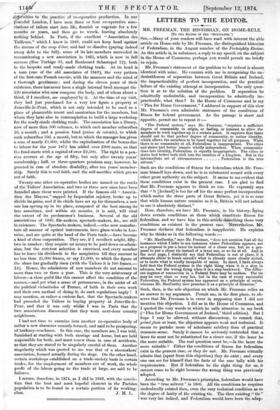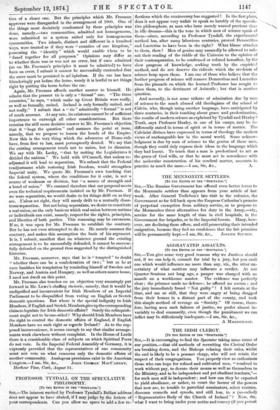LETTERS TO THE EDITOR.
MR. FREEMAN, THE HISTORIAN, ON HOME-RULE.
(TO THE EDITOR OF THE "SPECTATOR.")
Sin,—Many of your readers will have read with interest the able article on Home-rule by Mr. Freeman, the distinguished historian of Federalism, in the August number of the Fortnightly Review. As this article is, in substance, a reply to my speech on the subject in the House of Commons, perhaps you would permit me briefly to rejoin.
Mr. Freeman's statement of the problem to be solved is almost identical with mine. He concurs with me in recognising the un- desirableness of separation between Great Britain and Ireland, the impracticability of perfect incorporation, and the practical failure of the existing attempt at incorporation. The only ques- tion is as to the solution of the problem. If separation be admittedly undesirable, and incorporation be admittedly im- practicable, what then? In the House of Commons and in my "Plea for Home Government," I adduced in support of this view Mr. Freeman's own admirable statement of the conditions of fitness for federal government. As the passage is short and apposite, permit me to repeat it :—
" The Federal system," says Mr. Freeman, "requires a sufficient degree of community in origin, or feeling, or interest to allow the members to work together up to a certain point. It requires that there should not be that perfect degree of community, or rather identity, which allows the members to be fused together for all purposes. When there is no community at all, Federalism is inappropriate. The cities and states had better remain wholly independent. When community rises into identity, Federalism is equally inappropriate. The cities or states had better both sink into the counties of a kingdom. But in the
intermediate set of circumstances Federalism is the true solvent."
Such are the conditions of fitness for federalism which Mr. Free- man himself lays down, and he is in substantial accord with every other great authority on the subject. It seems to me evident that these conditions exist in the present case. I am glad to find that Mr. Freeman appears to think so too. He expressly says that "it [Ireland] is too far off for the same perfect incorporation which unites the three parts of Great Britain, yet it is so near that while human nature remains as it is, Britain will not submit to see it absolutely distinct." Here, therefore, we have Mr. Freeman, in his history, taying down certain conditions as those which constitute fitness for federalism, and we have him in this article describing these very conditions as existent in the present case. Nevertheless, Mr. Freeman declares that federalism is inapplicable. He explains why he thinks so in the following words :—
" Mr. MacCarthy," says Mr. Freeman, "does not mention that all the instances which I refer to are instances where Federalism appears, not as a proposal to put a laxer tie instead of a closer one, but as a pro- posal to put a closer tie instead of a lamer one, or no tie at all. And in the next page, I distinctly say that Federalism is out of place, if it attempts either to break asunder what is already more closely united, or to unite what is wholly incapable of union. In short, I have always held that the Federal system is the right thing when it is a step in advance, but the wrong thing when it is a step backward. The differ- ent degrees of connection in a Federal State may be endless. The tie may be very close or very lax, but in the case df every successful Federation, the Federal system has appeared as a principle of union, whereas Mr. MacCarthy now preaches it as a principle of disunion."
Such, then, is the sole objection on which Mr. Freeman relies as an answer to my argument. Permit me, in the first place, to ob- serve that Mr. Freeman is in error in supposing that I did not mention this objection. I did so in the House of Commons, and I quoted the very words to which he calls attention in ray book (" Plea for Home Government of Jreland," third edition). But I hope I may be allowed, without discourtesy, to remark that, prima facie at least, the objection appears weak and technical. It seems to partake more of scholastic subtlety than of practical common-sense. Surely it cannot be seriously contended that a laxer tie must not be substituted for a closer one, if the laxer be the more suitable. The real question must be,—Is the laxer the more suitable ? Either the conditions of fitness for federalism exist in the present case, or they do not. Mr. Freeman virtually admits that (apart from this objection) they do exist ; and every one can see for himself that the facts of the case tally with his requirements. But if federalism be the right thing for us, it cannot cease to be right because the wrong thing was previously adopted.
According to Mr. Freeman's principles, federalism would have been the "true solvent" in 1800. All the conditions he requires undoubtedly existed then, even the very technical condition as to the degree of laxity of the existing tie. The then existing " tie " was very lax indeed, and Federalism would have been the adop- tion of a closer one. But the principles which Mr. Freeman approves were disregarded in the arrangement of 1800. One of the things most decisively condemned by these principles was done, namely,—two communities, admitted not homogeneous, were submitted to a system suited only for homogeneous communities. Two islands, distinct and different in a hundred
NI:ays, were treated as if they were "counties of one kingdom," possessing the " identity " which would enable them to be "fused together for all purposes." Opinions may differ as to whether there was or was not an error, but if once admitted (as on Mr. Freeman's principles it must be admitted) to have been an error, I submit it cannot be successfully contended that the error must be persisted in ad infinitum. If the car has been blunderingly put before the horse, surely it is lawful to set things right by putting the horse before the car. Again, Mr. Freeman affords another answer to himself. He admits that the present tie is only a "formal" one. "The three countries," he says, "which make up Great Britain were really, as well as formally, united. Ireland is only formally united, and not really." I submit that a " tie " admittedly " formal " is not of much account. At any rate, its existence cannot be of sufficient importrnce to outweigh all other considerations. But there remains the still more decisive answer to Mr. Freeman's objection that it "begs the question" and assumes the point at issue, namely, that we propose to loosen the bonds of the Empire. Now this is the very thing which the advocates of Home-rule have, from first to last, most peremptorily denied. We say that the existing arrangement tends not to union, but to disunion. We say with Mr. Lecky, "that by uniting the Legislatures it divided the nations." We hold with O'Connell, that unless re- adjusted it will lead to separation. We submit that the Federal readjustment while restoring Irish freedom, would strengthen Imperial unity. We quote Mr. Freeman's own teaching that the federal system, where the conditions for it exist, is not a source of weakness or division, but "a source of strength and a bond of union." We contend therefore that our proposal meets even the technical requirements insisted on by Mr. Freeman. If we were separatists, we would desire to let things drift on as they are. Unless set right, they will surely drift to a mutually disas- trous separation. But not being separatists, we desire to constitute a real union, on the only basis on which real union between nations or individuals can exist, namely, respect for the rights, principles, and liberties of both parties. This reasoning may be erroneous. If so, it was open for Mr. Freeman to establish the contrary. But he has not even attempted to do so. lie merely assumes the contrary, and makes this assumption the basis of his argument. It is, I submit, manifest that on whatever ground the existing arrangement is to be successfully defended, it cannot be success- fully defended on the ground thus suggested by the distinguished historian.
Mr. Freeman, moreover, says that he is " tempted " to doubt "whether there can be a confederation of two ; " but as he at once banishes his temptation by reminding himself of Sweden and Norway, and Austria and Hungary, as well as others nearer home, I need not dwell on this point.
Mr. Freeman also touches on an objection very amusingly put forward in Mr. Lowe's chaffing rhetoric, namely, that it would be undignified and inconvenient for Irish Members of an Imperial Parliament to be disqualified from voting on English or Scotch domestic questions. But where is the special indignity to Irish Members, if English and Scotch Members give up the corresponding claim to legislate for Irish domestic affairs? Surely the relinquish- ment ought not to be one-sided? Why should Irish Members have the right to control the domestic affairs of England, if English Members have no such right as regards Ireland? As to the sup- posed inconvenience, it seems enough to say that similar arrange- ments work elsewhere without complaint. In the House of Lords there is a considerable class of subjects on which Spiritual Peers do not vote. In the Imperial Federal Assembly of Germany, it is expressly provided that the representatives of one community must not vote on what concerns only the domestic affairs of another community. Analogous provisions exist in the American































 Previous page
Previous page